Colombian street food seems to be available everywhere in Medellín and other cities in Colombia. And there are so many options. Colombian street food can be found at busy intersections, in the parks, near metro stations and in many other places in the city. In this article, we look at 16 Colombian street food options you should definitely try.
Traveling is increasingly less about going somewhere to see historical sites and natural wonders, but venturing to a destination to taste the food. Certainly, for me indulging in the local cuisine is a major component of the ‘to-do’ list on my travels. In fact, I often find out what the local dishes are and where I should try them before I decide which major landmark to photograph.
I believe that to truly understand a country’s culture, history and people, you must first appreciate and understand its culinary specialties. And the best place to discover such delights is on the street.
Colombians are particularly fond of food that has a combination sweet and salty flavors. From fried food, to milky juices and all bewildering array of corn manifestations, nearly all of their dishes have hints of savory and sweet.
Colombian food is also very regional, and there is a different approach to national dishes in each city you visit. In fact, some of these dishes are only found here in Medellín. So, head to the streets to try these particularly Antioquian delights.
This list of 16 Colombian street food options is in alphabetical order.
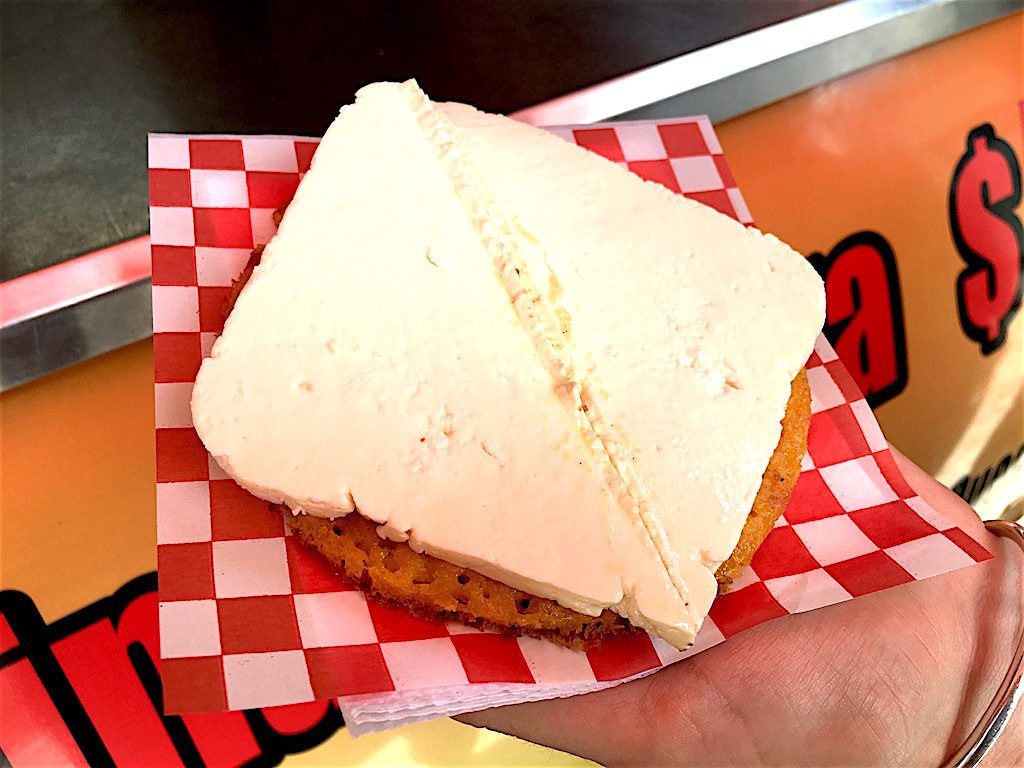
Arepas de chócolo are one of the most common street foods you will encounter in Colombia
1. Arepas de Chócolo
For a country that uses corn prolifically in their cooking, it is no wonder that arepas have become a street food staple in Colombia. Arepas come in numerous varieties. In restaurants, you’ll typically be served a bland white corn half-dollar version.
In stark difference, at street food stalls in the Andean region you’ll find the arepa de chócolo. These thick, sweet, yellow corn cakes are lathered in butter, then fried on a griddle until golden brown. Then more butter is slapped on before a quarter inch slice of Colombian fresh white cheese is placed on top.
In this street food mix, the corn patty provides the sweetness, whilst the creamy, soft cheese provides the contrasting salt.

Arepas de queso in Medellín are topped with a swirl of sweetened condensed milk to provide an indulgent snack
2. Arepas de Queso
In addition to the arepa de chócolo, you can indulge in a very unique arepa in Medellin called the arepa de queso.
Usually sold at the same stalls, this arepa version is a mixture of corn flour with copious amounts of cheese. This is stirred together as a batter then fried on a griddle. The mushy concoction is flattened to a patty then doused with sweetened condensed milk. A heart attack inducing treat for sure, but oh so worth the risk.

Būnelos are a savory take on the American donut ball and are the perfect accompaniment with a coffee for breakfast. This store near Parque El Poblano has been frying them up for over 20 years
3. Buñuelos
Buñuelos are both a traditional Christmas dish and a popular breakfast treat for Colombians.
Slightly larger than golfball size, these tasty morsels are concocted of salty flour and small curd white cheese. They are rolled into a ball then fried until golden brown.
Best served piping hot. Near Parque El Pobaldo on the corner of Calle 9 and Carrera 43B you can find a restaurant names El Peregrino that has been frying up this quintessential street food for Colombians and tourists alike for over 20 years.

Making Buñuelos at El Peregrino restaurant next to Parque Sabaneta
In Sabaneta, next to Parque Sabaneta to the right of the church is the El Peregrino restaurant that is famous for its Buñuelos. This place makes normal size Buñuelos as well some giant Buñuelos that are more watermelon size.

Colombian churros differ in appearance to their Spanish cousin, but still have that sweet, donut taste
4. Churros
Colombian churros are slightly different than the Spanish variety. Here they are small and circular and generally are served sprinkled with sugar instead of a side dish of chocolate. But they still have that sweet donut taste.
The churros pictured here are from a street vendor in Comuna 13, who indulged my sweet tooth by smothering my brown paper bag of full of churros with arequipe. Yum!
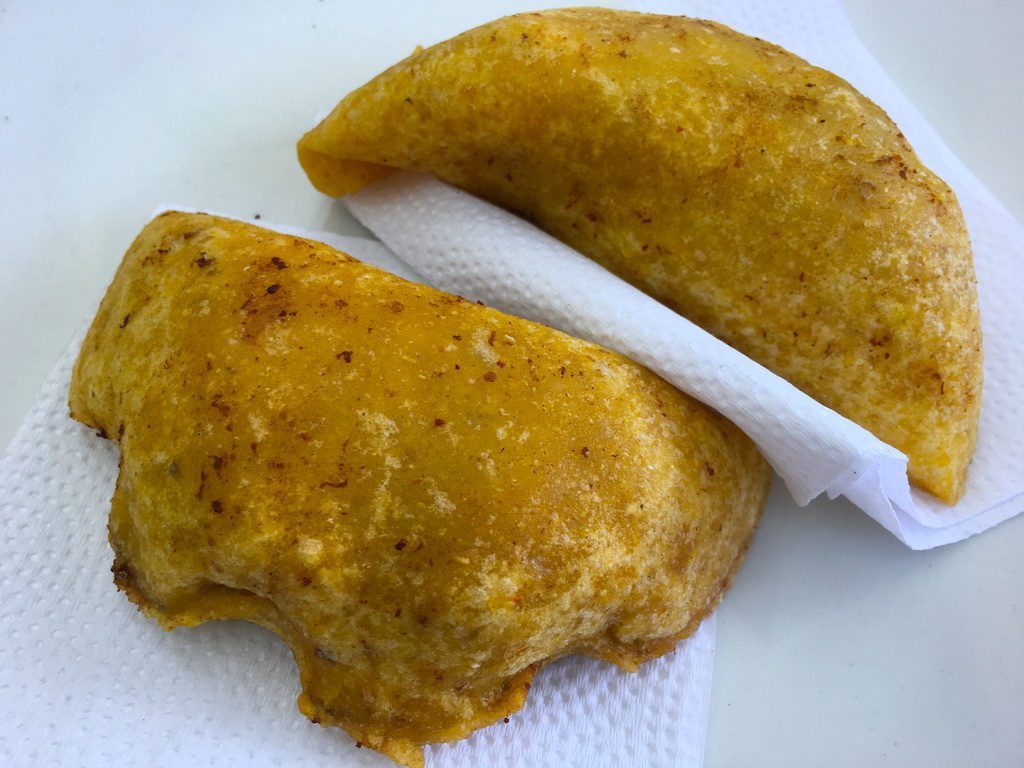
Empanadas are perhaps the most well-known Colombian street food and are readily available in different varieties
5. Empanadas
Empanadas are the ubiquitous Colombian street food. They are widely available everywhere, particularly street vendors.
These bite-sized snacks are typically stuffed with minced beef and cubed potatoes and encased in a cornmeal doughy bread that is deep fat fried. Vegetarian and chicken versions are also available. To spice up your empanada, try topping it with a teaspoon of fresh picante sauce.
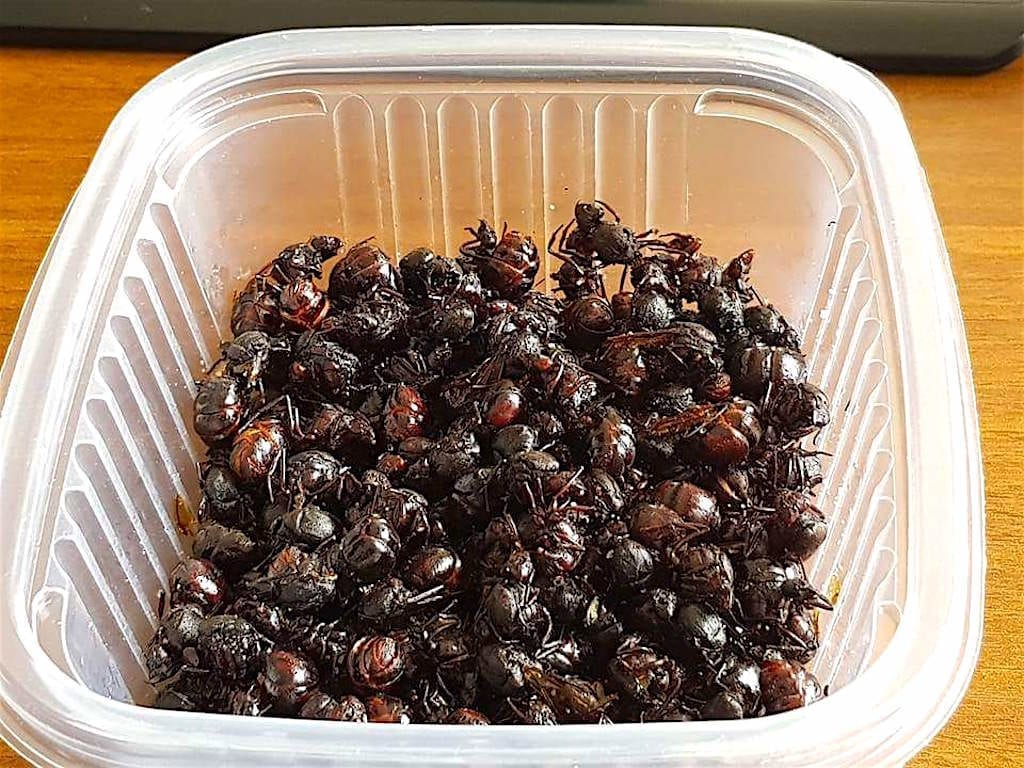
Hormigas Culonas, photo by Naira Abal
6. Hormigas Culonas (Ants)
Hormigas Culonas are considered a delicacy in the Santander region of Colombia. Hormigas Culonas translated literally means “big bottom ants”.
They ants are roasted with salt and you eat the backside of the ants, not the heads. And they taste kind of like popcorn.
Also, if you happen to go during the dry season, keep in mind the ants aren’t the freshest. The ants are harvested during the rainy season.You can buy them in jars or paper bags at street stalls, notably in the pueblo of San Gil and the colonial town of Barichara.
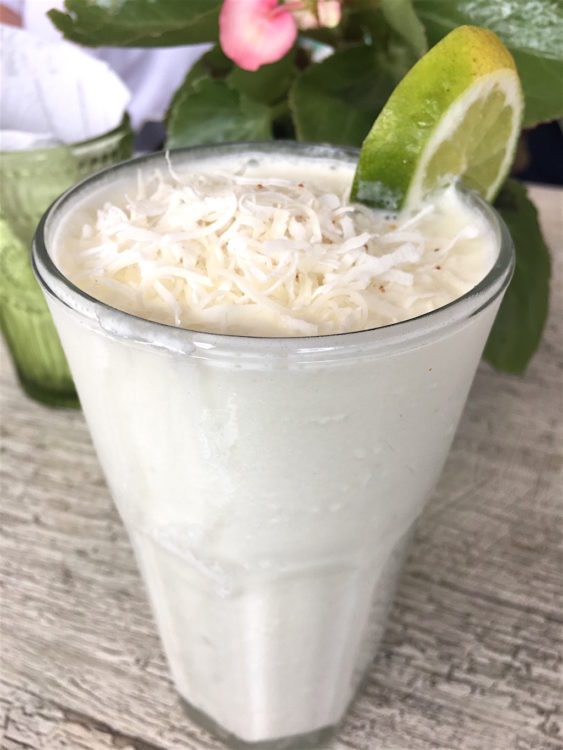
Tropical fruit juices, made with either milk or water, are abundant in Colombia and come in a dizzying array of varieties, from the limonada de coco pictured here to passion fruit
7. Jugos (Juices)
Due to the region’s abundance of fresh tropical fruit on hand, it is no surprise juices are a cornerstone of the Colombian diet. From the local mercado (market) to specialized stands like Cosechas (www.cosechasexpress.com), to every restaurant menu, you don’t have to go far to find a jugos (fruit juice).
My favorite has become the limonada de coco – a blend of ice, coconut milk and lime. A refreshing afternoon pick-me-up. Jugos are typically made to your liking with your choice of aqua (water) or leche (milk) and sin (without) or con (with) azúcar (sugar).
More unusual fruit varieties to try in your jugos include the borojó, which is a fruit from the West Country that locals claim has aphrodisiac qualities, but to me tastes like cheese that’s gone off. Also popular are soursop, guanábana, lulo and maracuyá (passion fruit).

You can find Lechona on the street being sold in hunks or strips
8. Lechona
Lechona is one of the most popular Colombian dishes for large parties. The lechona is a traditional Colombian dish from the Tolima Department of central Colombia.
This isa suckling pig slow-cooked over a hot charcoal pit until the skin is crispy. Street vendors sell it in chunks or strips, like pulled pork, often accompanied with hot sauce (aji picante) and a tamale or arepas.

Merengón dessert
9. Merengón
You should be familiar with this dessert that you can find being sold by some street vendors, Merengón is the Colombian version of meringue. This dessert is normally served with fruit and is filled with whipped cream, and made up of layers and layers of lovely, crunchy meringue.
Popular fruit fillings for Merengón include strawberries, guanabana or peaches.

Obleas are a Colombian dessert that stuffs cheese, jam, and caramel sauce between layers of thin wafers
10. Obleas
One of the more intriguing Colombia street food options I’ve tried in Colombia is the oblea – a traditional sweet treat that you can find in every major city.
Obleas consist of plate sized thin wafers that are sandwiched with your choice of a bewildering mix of fillings. The todo (all) version is first spread with a thin layer of raspberry jam. Then another wafer is stacked on top before adding a thick layer of shredded white cheese. On goes yet another wafer, where in the third layer arequipe (a caramel sauce made with sweetened condensed milk) is added.
This sandwich process continues until you have an inch wedge stack that gets wrapped in foil before being presented to you. This combination of sweet and salty was a step too far me, but worth a try once.
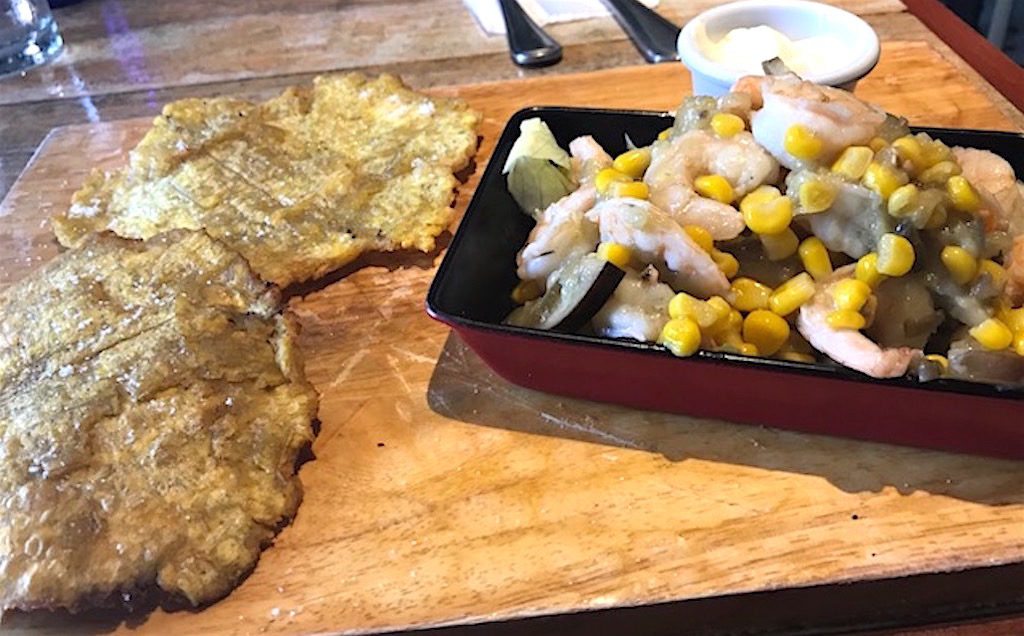
In Cartagena, Colombian patacones are served with fresh ceviche
11. Patacones
You must try patacones. Patacones are made from mashed green plantains that are shaped into a flat patty then twice-fried.
Served frequently in restaurants as a side dish, they are also commonly sold by street vendors. This snack can be spiced up with hagao (tomato and onion sauce) or topped with an array of meats and avocado.
12. Picada
If you want a truly filling Colombian street food then seek out a picada (the word means “chopped”).
This is a street dish overflowing with chunks of grilled chorizo, steak, and maybe an intestine or two. This platter typically comes with all the trimmings: corn on the cob, plantain, yucca, and boiled papas criollas (new potatoes) stewed in herbs.

Raspao in Cartagena, photo by Jimmy Gómez
13. Raspao
This Colombian street food option is especially popular in Cartagena, where they’re served to beat the stifling heat.
These are shaved-ice snow cones drizzled with fruit juice and are an irresistible way to beat the heat. You’ll find them sold from carts in all major towns in of coastal Colombia including Barranquilla, Cartagena and Santa Marta.

Salchipapa, photo by Migueltautiva
14. Salchipapa
Last but not least, a salchipapa is a cross of a hot dog (salchicha) with a potato (papa). This is a Colombian street food staple. It’s a plate of chunky hot fried papas and sausage is served with ketchup and other savory sauces. This sometimes includes quail eggs.

Colombian Tamale, photo courtesy of Tamales Exquisitos
15. Tamales
Tamales are corn or corn/rice cakes that are made in Colombia with a wrapping in platain tree leaves and steamed. In Colombia, tamales can be filled with everything from chicken, pork, rice, potatoes, peas, carrots, corn and cheeses.
Tamales in Colombia can vary in shape and fillings in each region. Some well-known variations are from Bogotá, Cúcuta, Santander (Bucaramanga), Tolima and Valle del Cauca (Cali). For example, the Tamales Tolimenses, which are from the Tolima region, are filled with pork, chicken, rice, potatoes, peas and a variation of spices.
You can find normally find tamales being sold near several of the parks in the Medellín metro area.
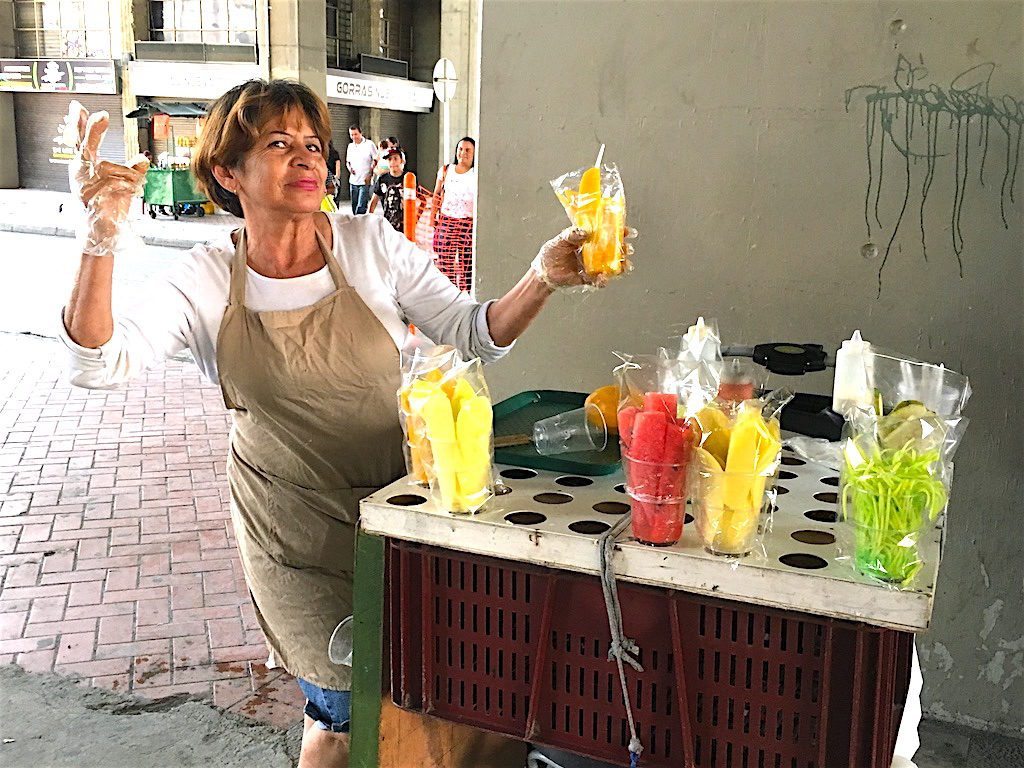
Plastic cups full of sliced tropical fruit can be purchased all over Medellin from street food carts. Maria at San Antonio stations arguably sells the best ripe mango in town
16. Tropical Fruit
Last but not least, Colombia offers a cornucopia of exotic tropical fruits – many you may have never heard of. And all over Medellin you will find ladies with carts dishing up sliced fresh fruit in plastic ups.
One of the most popular options is mango. Colombians like to indulge in a cup of sliced green mango doused in lime juice and salt and served with a toothpick as an afternoon snack.
One of the best places to try this sensation is at San Antonio metro station. Just at the entrance to the tramway you will find the super friendly Maria most weekends with her cart of fresh tropical fruit, ready to delight your taste buds.
Medellin Guru’s Guide to Colombian Food and Drinks
On the Medellin Guru website, we have six articles covering Colombian food and drinks:
- 16 Traditional Colombian Food Dishes You Must Try in Colombia
- 16 Colombian Street Food Options You Really Must Try
- 15 Popular Colombian Desserts You Must Try While in Colombia
- 30 Exotic Tropical Fruits of Colombia a Fruit Lovers Paradise
- 13 Traditional Colombian Drinks to Try When You Visit
- 11 Popular Colombian Soups to Try When You Visit Colombia
Medellín Street Food Tours
Several companies in Medellin offer street food excursions.
These tours not only takes you to the best places to try all of these foods, but also integrates a historical overview of the city and a first-hand account of how Medellin is transforming through urban regeneration projects and street art.
Here are two Medellín Street Food tour options:
- La Mesa Medellín Street Food Tour – about 3 hours for $55 per adult and $18 per child aged 7-13, under 7 free.
- Tasty Town Medellín Street Food Tour – about 3 hours for $42.99 per adult and $13.99 per child aged 7-13.
Bogotá and Cartagena Street Food Tours
Street food tours are also available in Bogotá and Cartagena. And here are four tours in Bogotá and Cartagena:
- La Mesa Bogotá Street Food Tour – about 3 hours for $55 per adult and $19 per child aged 7-13, under 7 free.
- Free Tour Bogotá Street Food Tour – about 3 hours and free but tips are recommended.
- Cartagena Connections Cartagena Street Food Tour – about 2 to 2.5 hours for $30.
- La Mesa Cartagena Street Food Tour – about 3 hours for $55 per adult and $19 per child aged 7-13, under 7 free.
The Bottom Line: Colombian Street Food Options – Take a Street Food Tour
Are your taste buds watering yet for these Colombian street food options? If your stomach is aching to try all of these delicacies, then I highly recommend a street food tour.
Alternatively, explore the streets on your own and let your adventurous taste buds lead the way. But whatever you do, make sure your tourist itinerary of Medellin includes some stops to eat delicious street food.
Sign up for the Free Medellin Guru Newsletter – You can see all of the previous Medellin Guru weekly email newsletters and sign up here.
Editors note: updated on October 4, 2018 to add street food tour options in Medellín, Bogotá and Cartagena based on a reader suggestion.
Editors note: updated on March 28, 2021 to add seven street food options to make the list more complete.


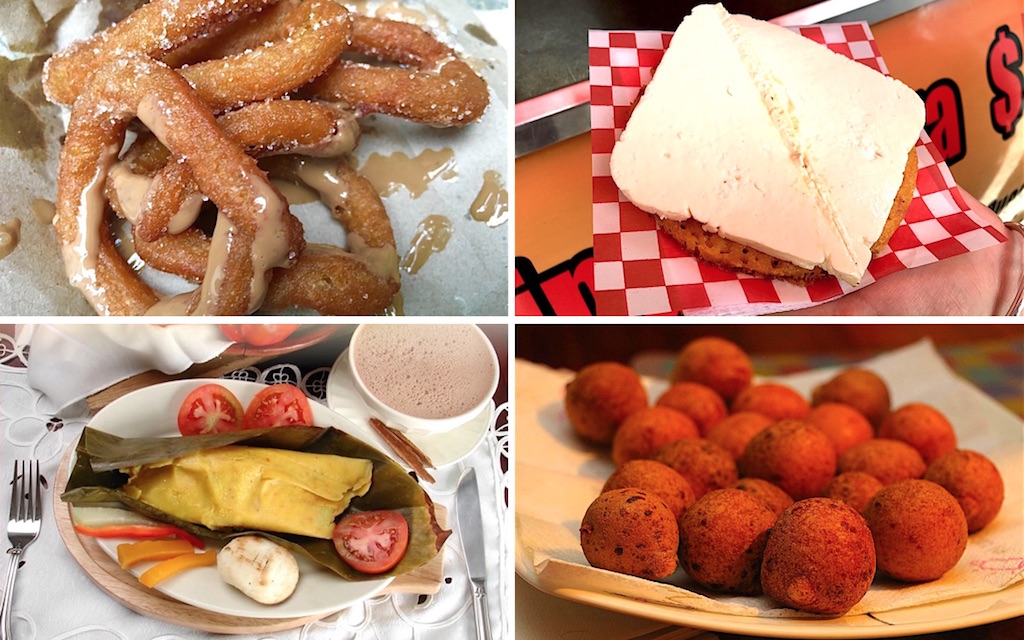
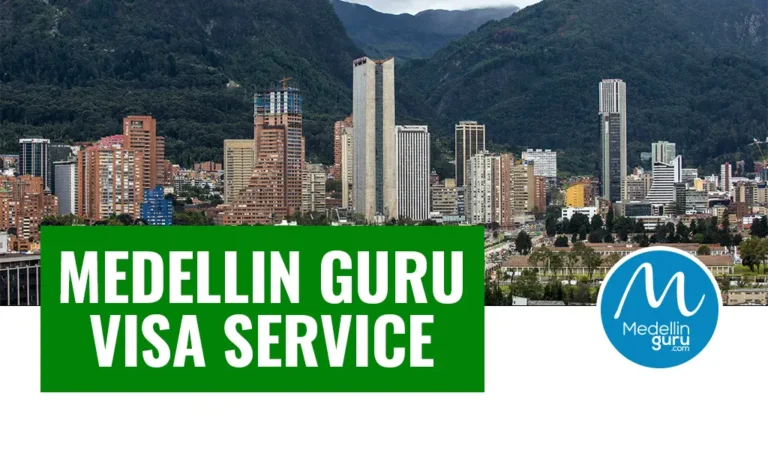
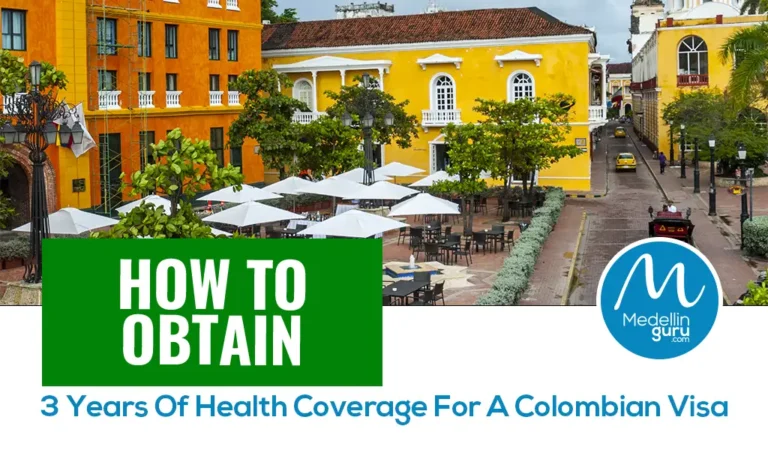

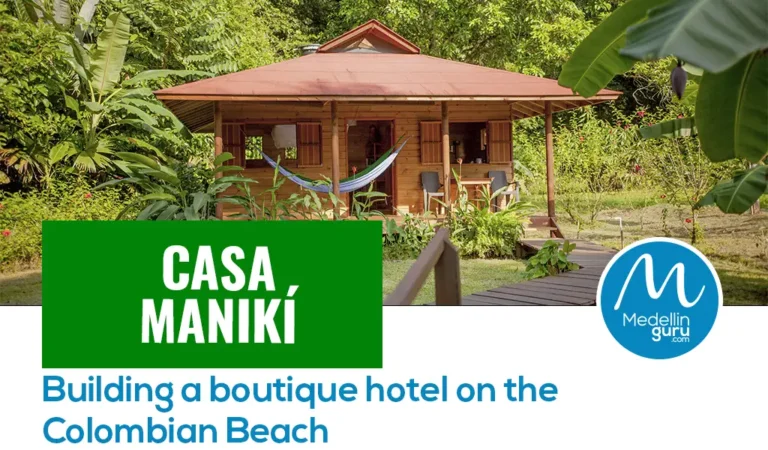




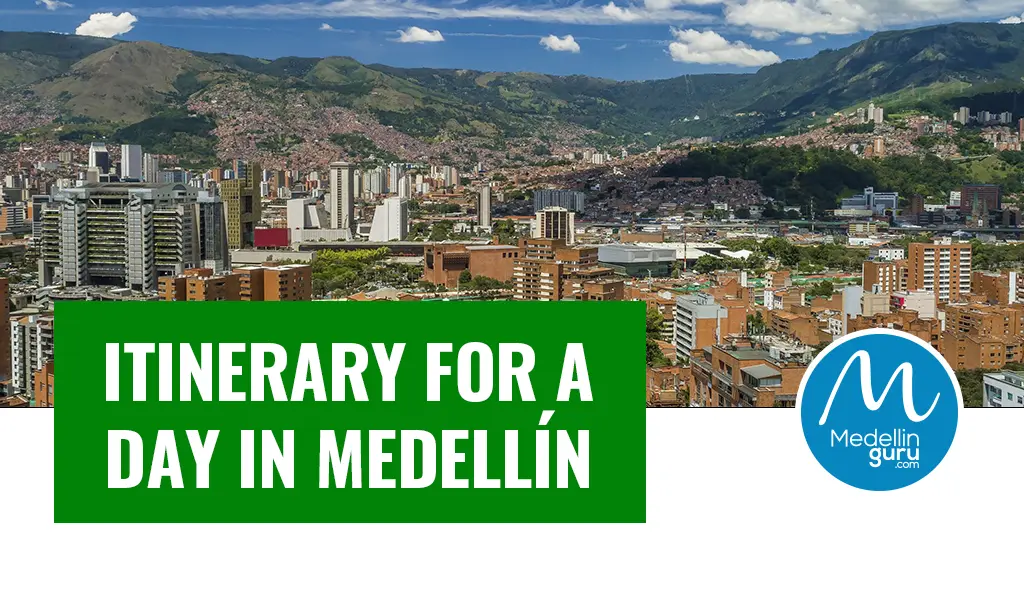
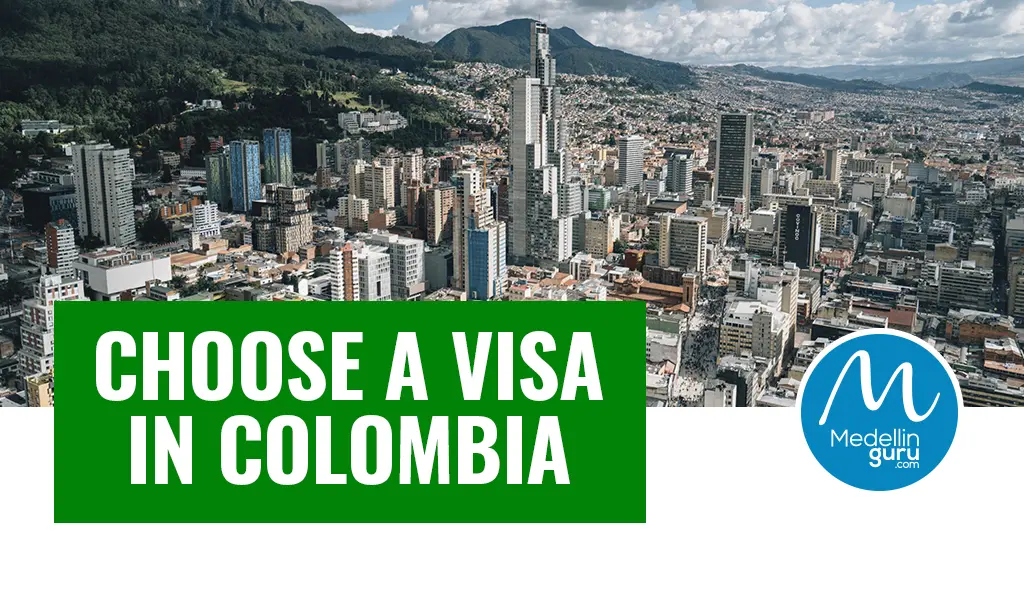
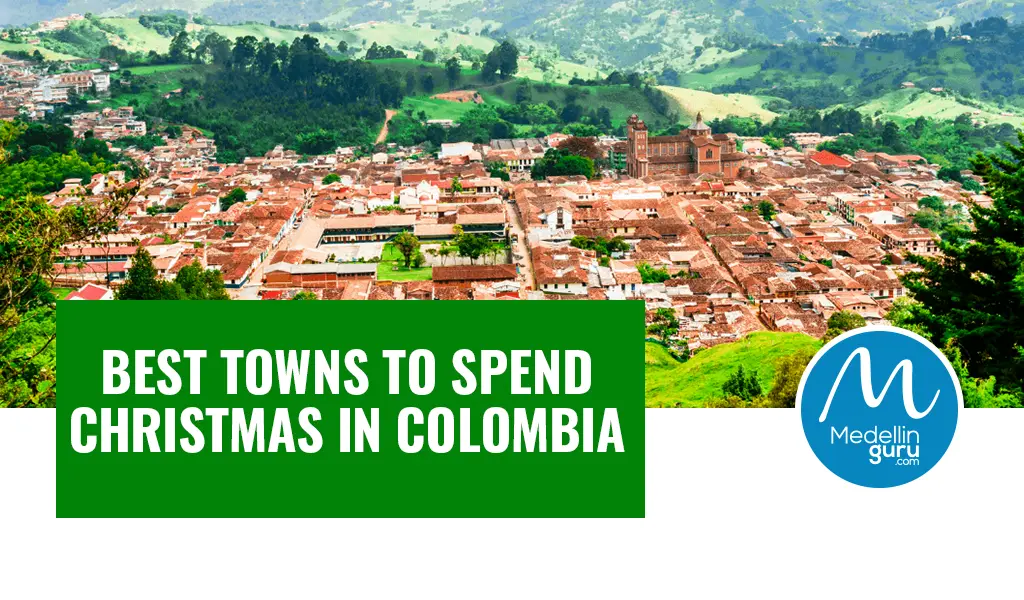














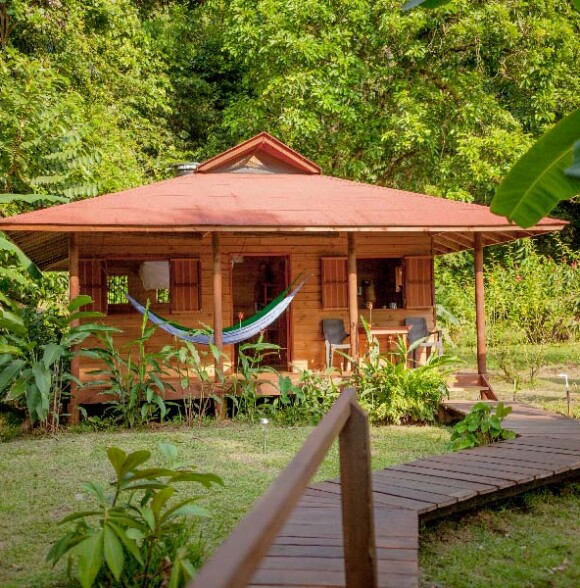





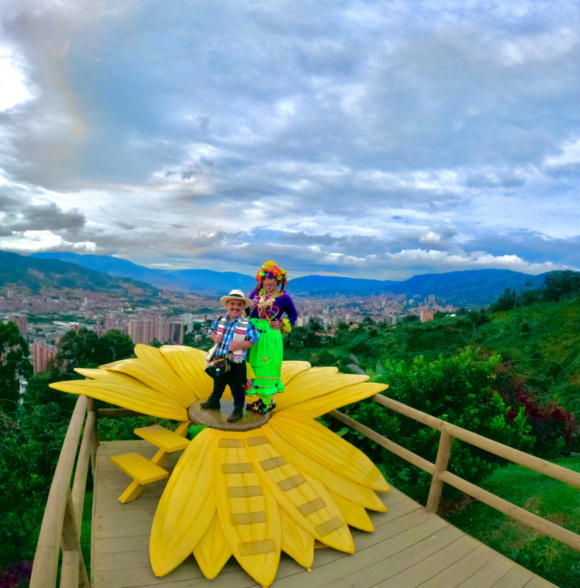

5 thoughts on “16 Colombian Street Food Options You Really Must Try”
Bueñuelos, pandequeso, pastel de arequipe is delicious and also pastel de guayaba. Many many more. I have been away from Medellin for most of my life and I’m finally coming back. Love this city!
Thanks Gwendolyn great article. Something to look forward to when I get there!
Cheers, Brock
Se llaman Buñuelos, no Bûnelos
Gracias el error tipográfico es fijo – the typographical error is fixed.
Great article, thanks! I have tried 4 of the street foods on this list and I need to try the rest.